Meetings are the most expensive business activity within enterprises. Meetings are an important tool for enterprise management and decision-making. In the business process, whether it's top-level management or frontline employees, numerous meetings need to be organized or participated in. However, meetings are also the most expensive business activity within enterprises. A formula proposed by a Japanese company (meeting cost = 2S x Q x T) can help companies quantify the cost of meetings, where S is three times the employees' average hourly wage, Q is the number of participants, and T is the meeting duration in hours. A rough estimation suggests that a one-hour meeting with six participants costs around CNY 1,711. Meeting costs multiply rapidly as the number of participates and meeting duration increases. (*The S value calculation uses the 2023 annual average wage of employees in Chinese enterprises above designated size: CNY 98,096.) However, research data shows that more than 50% of meeting time is actually wasted: meetings lack structure, one-hour meetings become endless marathons; meetings are filled with individuals' presentations but rarely result in consensus; useful conclusions are hard to come by but no action plans follow. These types of meetings not only waste valuable time but also leave team members exhausted in their daily work.
✦Meetings Are the Most Expensive Business Activity
Meetings are an essential tool for business management and decision-making. In the operation of any enterprise, whether executives or frontline staff, all need to organize or participate in many meetings.
However, meetings are also the most expensive business activity in enterprises. A formula proposed by a Japanese company (meeting cost = 2S x Q x T) can help companies quantify the cost of meetings, where S is three times the employees' average hourly wage, Q is the number of participants, and T is the meeting duration in hours. A rough estimation suggests that a one-hour meeting with six participants costs around CNY 1,711. Meeting costs increase significantly with more participants and longer durations. (*The S value calculation uses the 2023 annual average wage of employees in Chinese enterprises above designated size: CNY 98,096.)
However, research data indicate that more than 50% of meeting time is actually wasted: meetings lack rhythm, with one-hour meetings turning into endless marathons; meetings are full of participants’ opinions, yet reaching consensus is rare; even if conclusions are made, no action plan is made...These types of meetings not only waste precious time but also leave team members increasingly exhausted in their daily work.

✦What Constitutes a High-Quality Meeting
A meeting is when two or more people gather to discuss one or more topics, often in a formal or business setting, but meetings also occur in various other environments. Meetings can serve as a method for group decision-making.
——Wikipedia
According to this definition from Wikipedia, whether small meetings involving only two or three people or large gatherings of hundreds or even thousands, whether a one-way information sharing session or collective brainstorming, the essence of any meeting revolves around two elements: Discussion and Decision.
Through servicing numerous clients, DingTalk discovered many enterprises produce many decisions and conclusions in meetings that are not effectively executed, which is a major reason for inefficient meetings. We believe the core elements of a high-quality meeting are efficient discussion and effective conclusions. To hold a truly high-quality meeting, not only must the discussion during the meeting be efficient, but the conclusions must also be executed after the meeting concludes.
✦Hold High-Quality Meetings with DingTalk
To help enterprises of different scales, industries, and cultures implement high-quality meetings from theory to practice, DingTalk connected IM, Calendar, A/V, Xiao Mian (DingFlash Meeting), and DingTalk Projects (Teambition), constructing a high-quality meeting solution covering all stages before, during, and after meetings.
The solution helps enterprises hold meetings that are thematic, well-prepared, disciplined, recorded, conclusive, followed up, and result-oriented.
Before Meeting | With Themes and Preparation
1. Intelligent Meeting Scheduling, Locks in Optimal Meeting Time
Initiate an invitation in the DingTalk calendar and the system will recommend optimal meeting time slots and corresponding available meeting rooms according to attendees' availability, facilitating fast confirmation of the best meeting time.
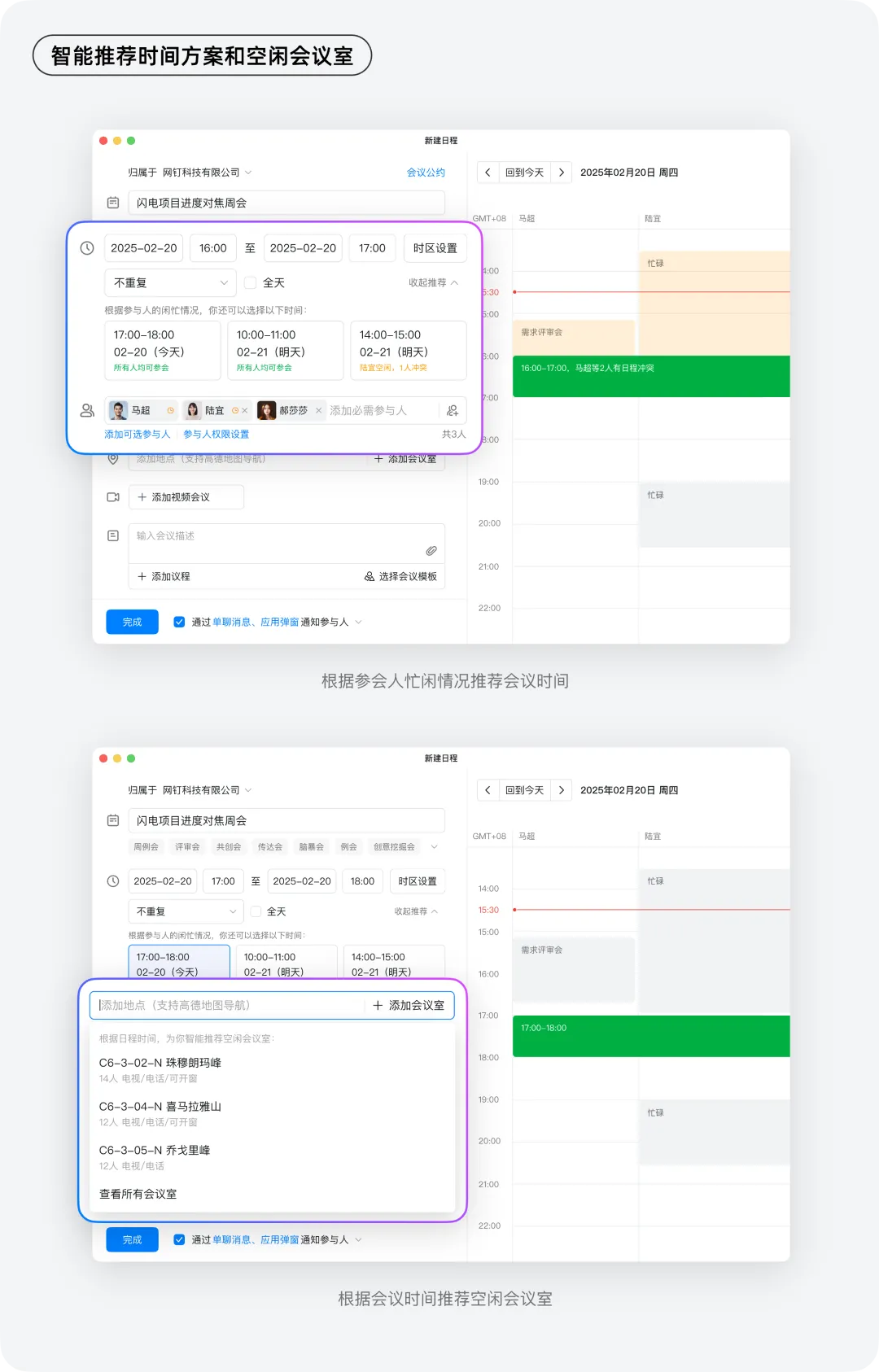
2. Meeting Templates, Organized and Clear Agendas
Enterprises can configure meeting types according to actual conditions, associate meeting types with corresponding templates and agendas, thus standardizing enterprise meeting processes. Organizers set a responsible person and planned discussion duration for each agenda item; responsible persons fill in the pre-meeting materials within Xiao Mian (DingFlash Meeting), gathering all meeting information into one accessible and reviewable location for meeting asset digitalization.
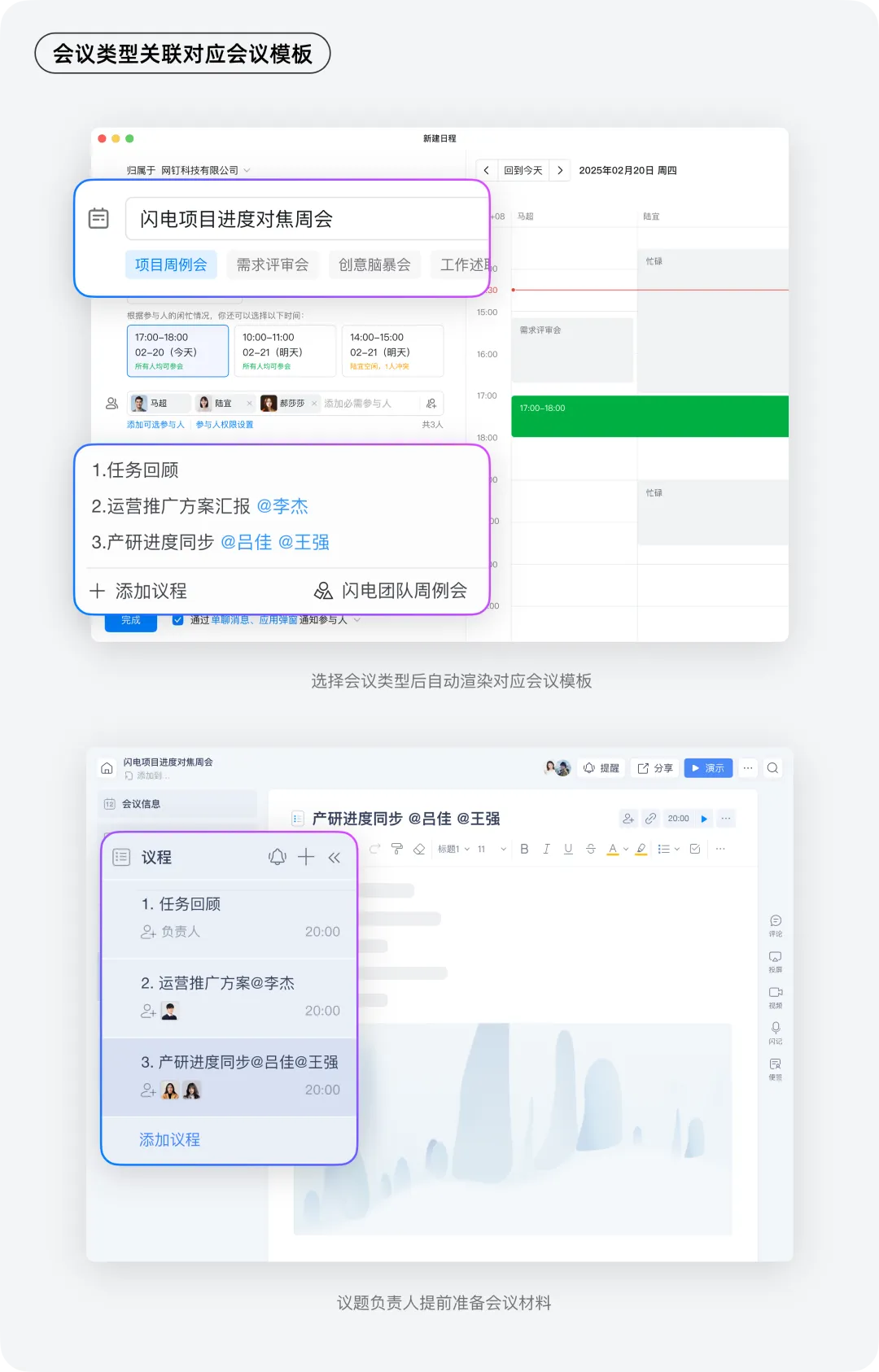
3. In-meeting Material Annotation for Focused Pre-reading
All participants can pre-read meeting materials and use inline annotations to quickly identify and focus on key issues, saving discussion time during the meeting.
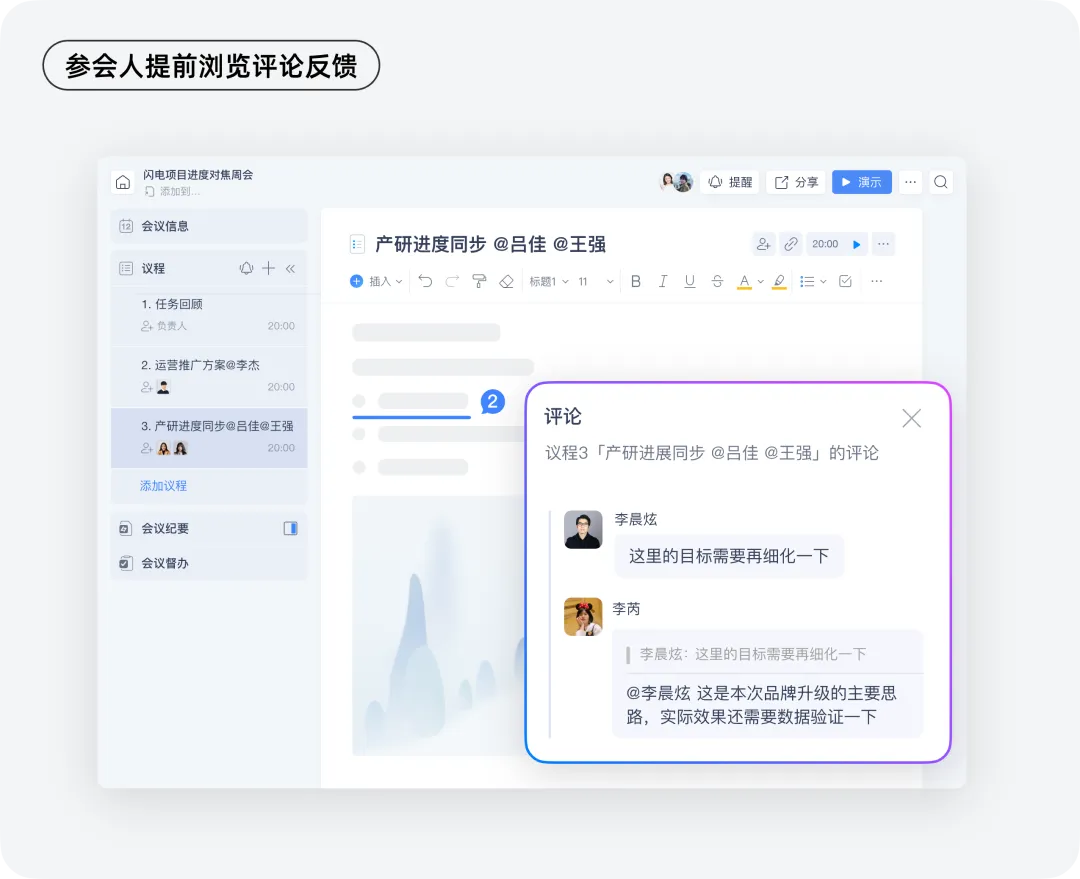
During Meeting | Discipline, Recording, and Clear Conclusions
1. Presentation Timer with Immersive Experience
Once presentation mode is activated, participants’ screens automatically switch to the presenter’s full-screen view, simulating an immersive screen mirroring experience. Countdown reminders help organizers strictly control the meeting process, avoiding meeting overruns.
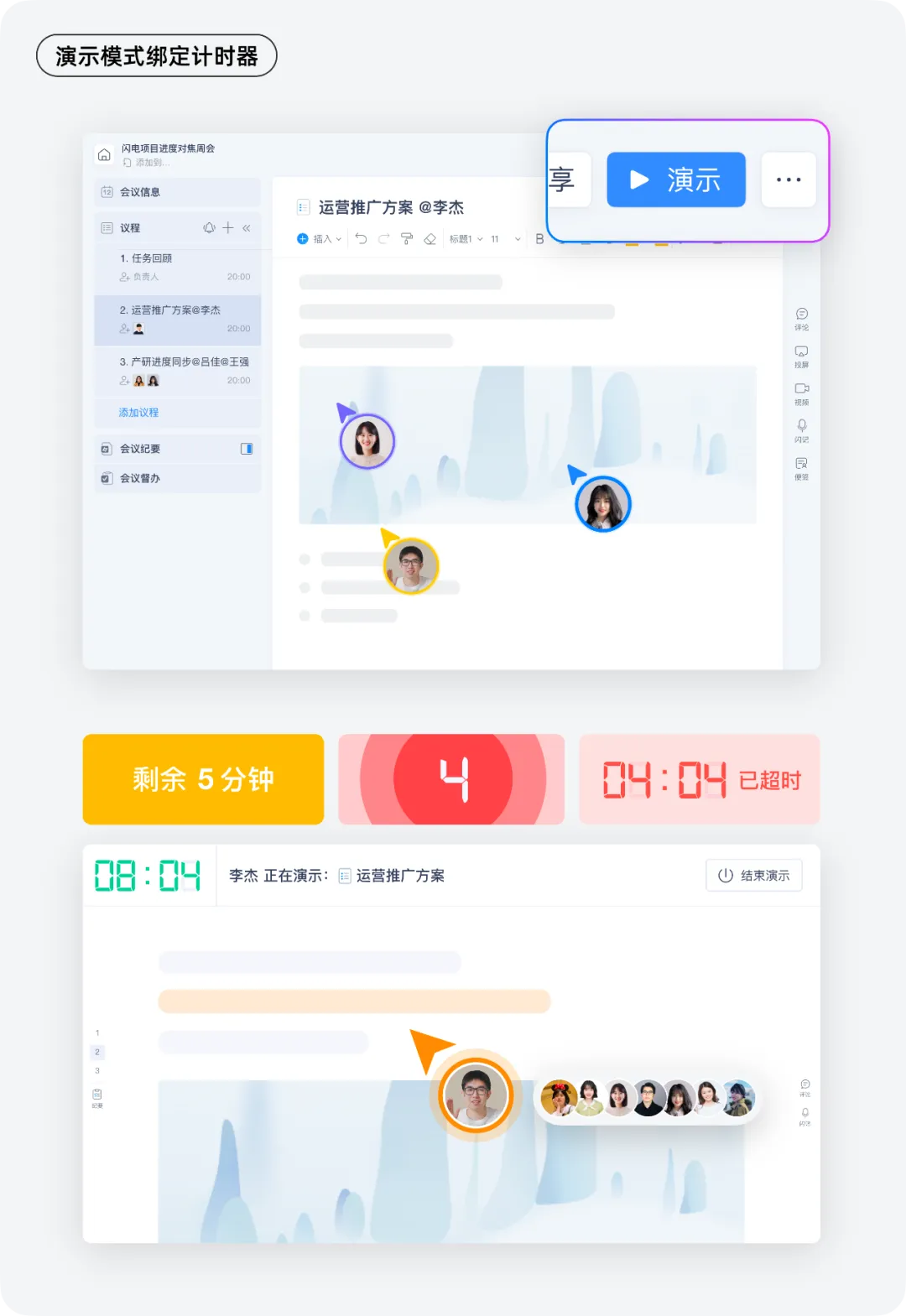
2. Online Meetings, Subtitles, and Translation for Improved Remote Collaboration
DingTalk video conferencing ensures consistent online and in-person meeting experiences. Online participants can view the currently presented agenda item in real-time and seamlessly join the discussion. Automatic real-time subtitles and multi-language translation capabilities enable participants from different countries to engage in discussions easily, ensuring accurate and efficient communication and thereby significantly improving efficiency in international meetings.
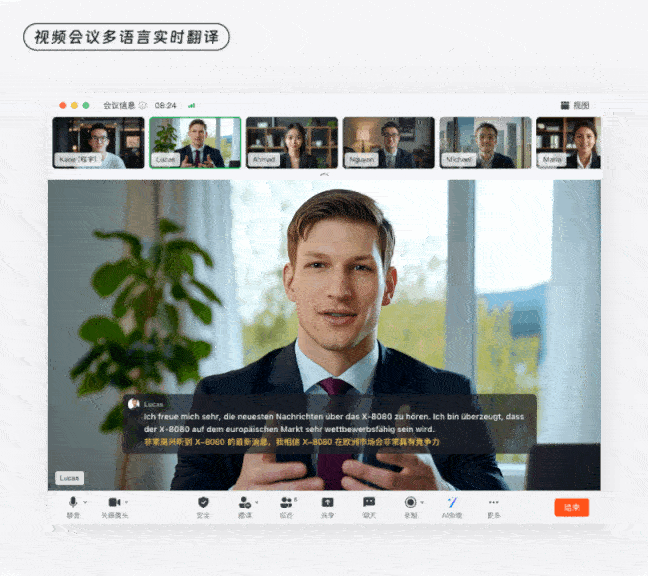
3. Task Documentation, Ensuring Accountability
Decisions and pending items arising from the meeting can be assigned to specific team members with set deadlines to ensure every task has an accountable person, avoiding disputes.
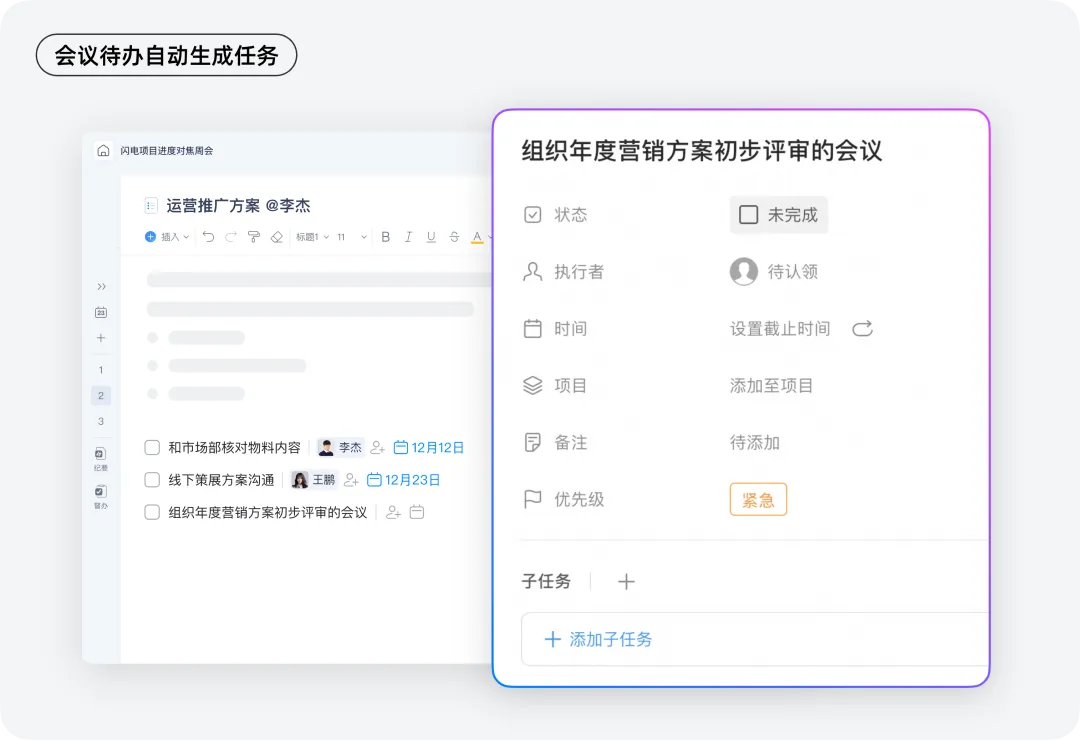
4. Finalize and Share Meeting Outcomes Promptly
Agreements and conclusions reached during the meeting can be documented in the meeting minutes. Once the minutes are finalized, they can be locked for no further editing and be submitted for approval. The finalized minutes document can be shared with all attendees via a one-click chat function, avoiding information loss risks typically seen in verbal communication.
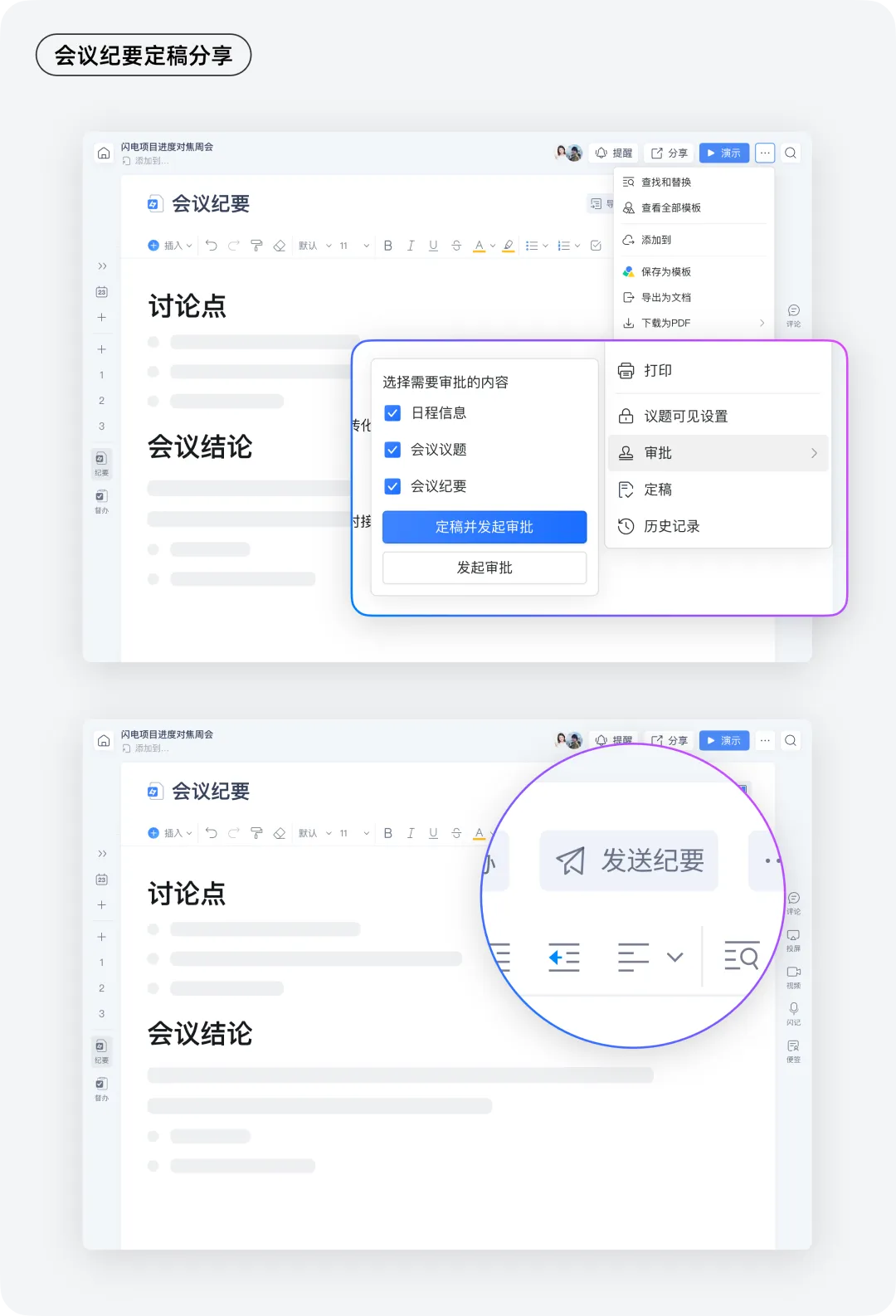
After Meeting | Follow-Up and Results
1. Meeting Task Administration, All Tasks Aggregated and Easy Tracking
All pending items produced during meetings are automatically aggregated into one unified dashboard, avoiding scattered or lost information. Task status can be seen at a glance and handling task creation, breakdown, assignment, execution, and completion can all be efficiently managed within one form.
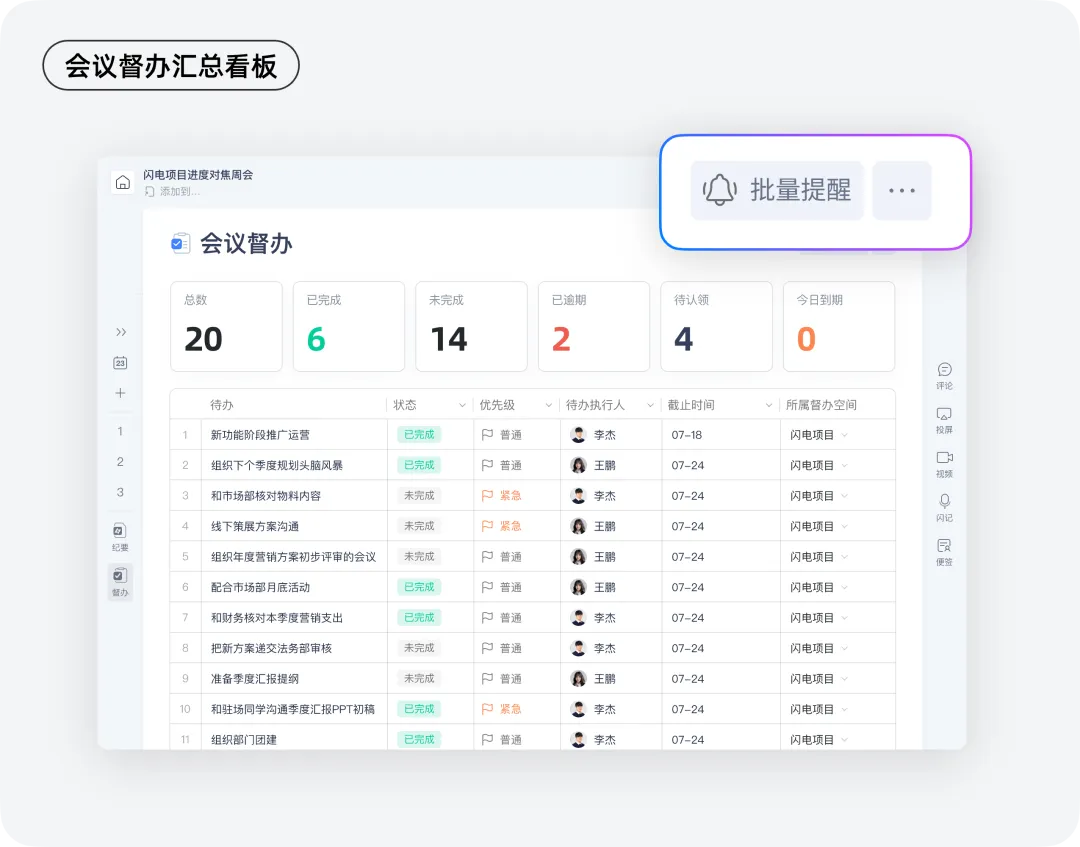
2. Task Reminders, Multi-Channel Notifications for Task Execution
After the meeting concludes, the executor's schedule will display task information for handling reminders to finish on time. Important task updates can be simultaneously synchronized to group chats and system accounts, ensuring everyone knows task progress immediately. Project daily reports can automatically summarize task advancement, overdue risks, and other key information.
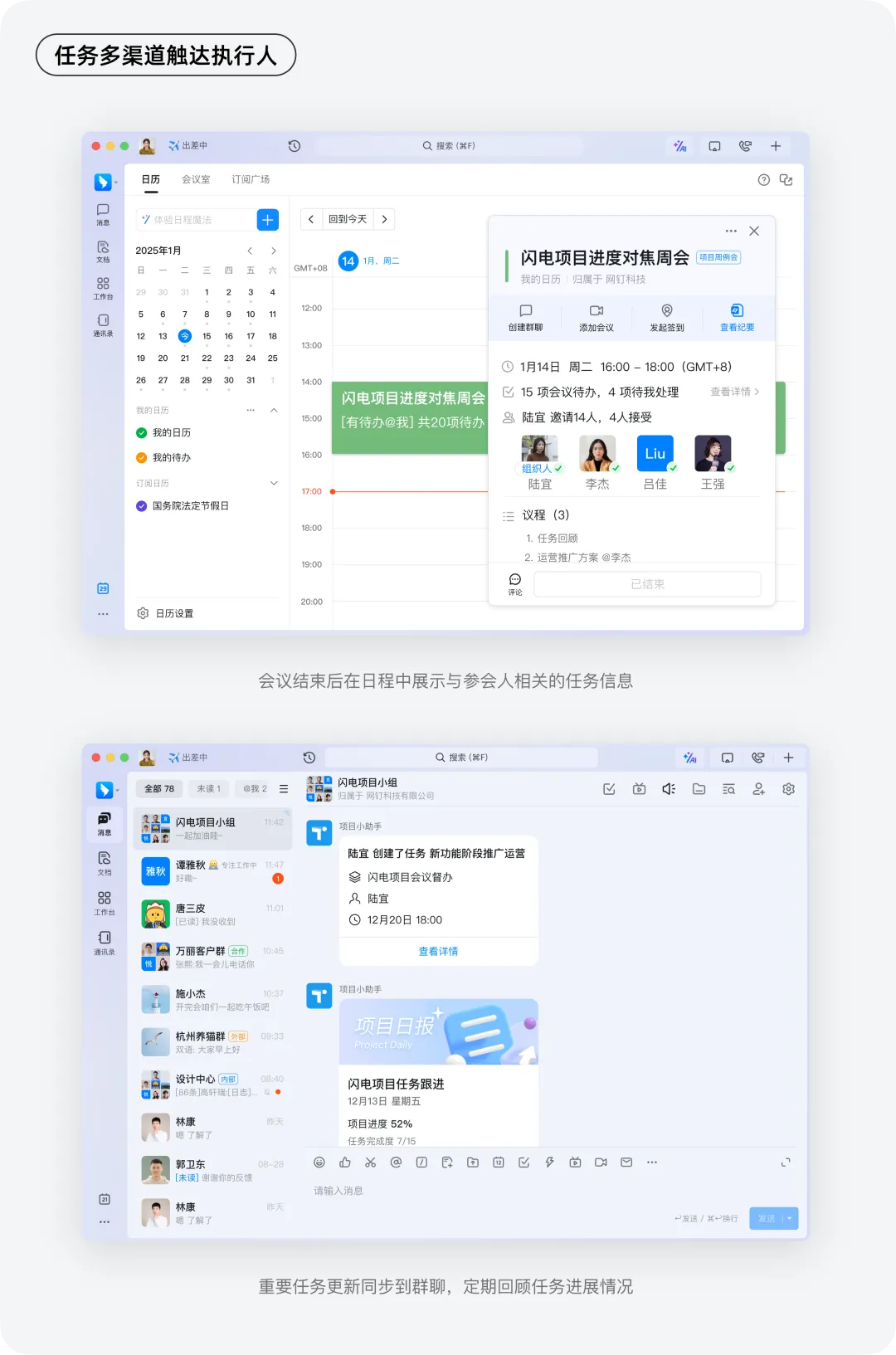
3. Progress Updates, Manager Accessibility from Anywhere
Meeting decisions managed as task items, supported by a robust task engine with flexible task field configuration (adding notes, splitting sub-tasks, uploading deliverables, comment interactions, etc.), summarizes all "to-do" information into one card. Managers can monitor all task progress in real time from mobile devices.
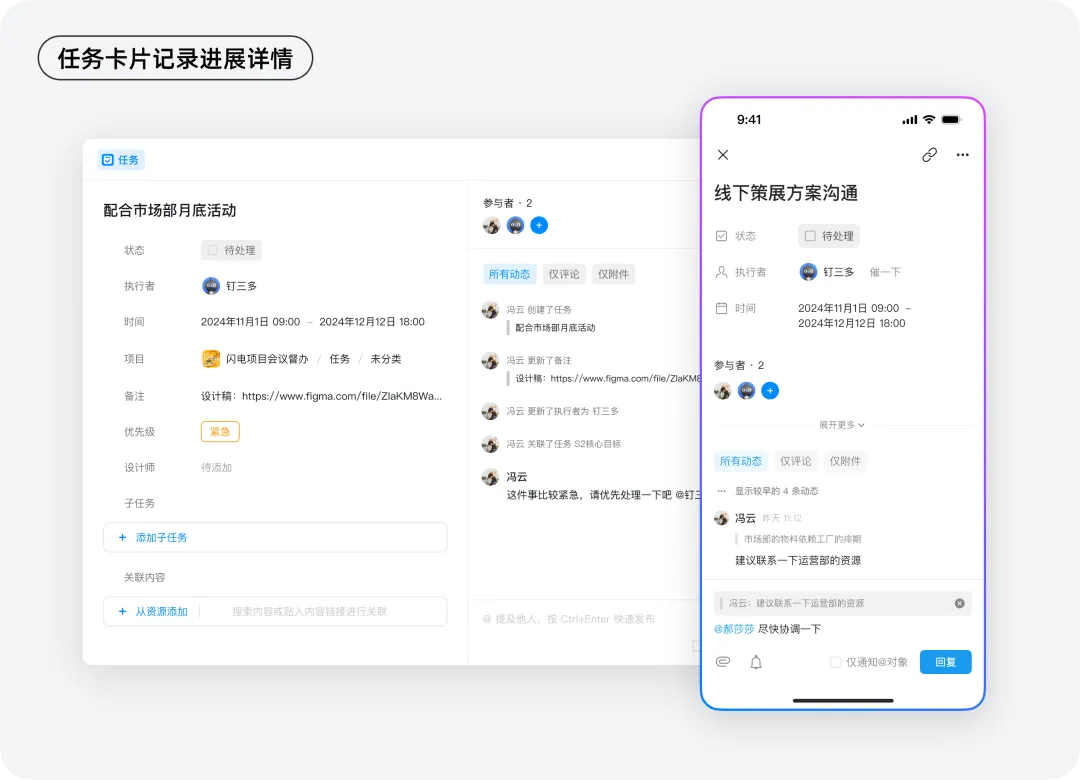
4. Upgrade Projects for Systematic Management of Meeting Decisions
Important and significant decisions from major meetings can be executed through DingTalk Projects (Teambition). Comprehensive project data reports, diverse progress views, and full open API capabilities will support enterprises in systematically managing, analyzing, and tracking meeting decision implementation.
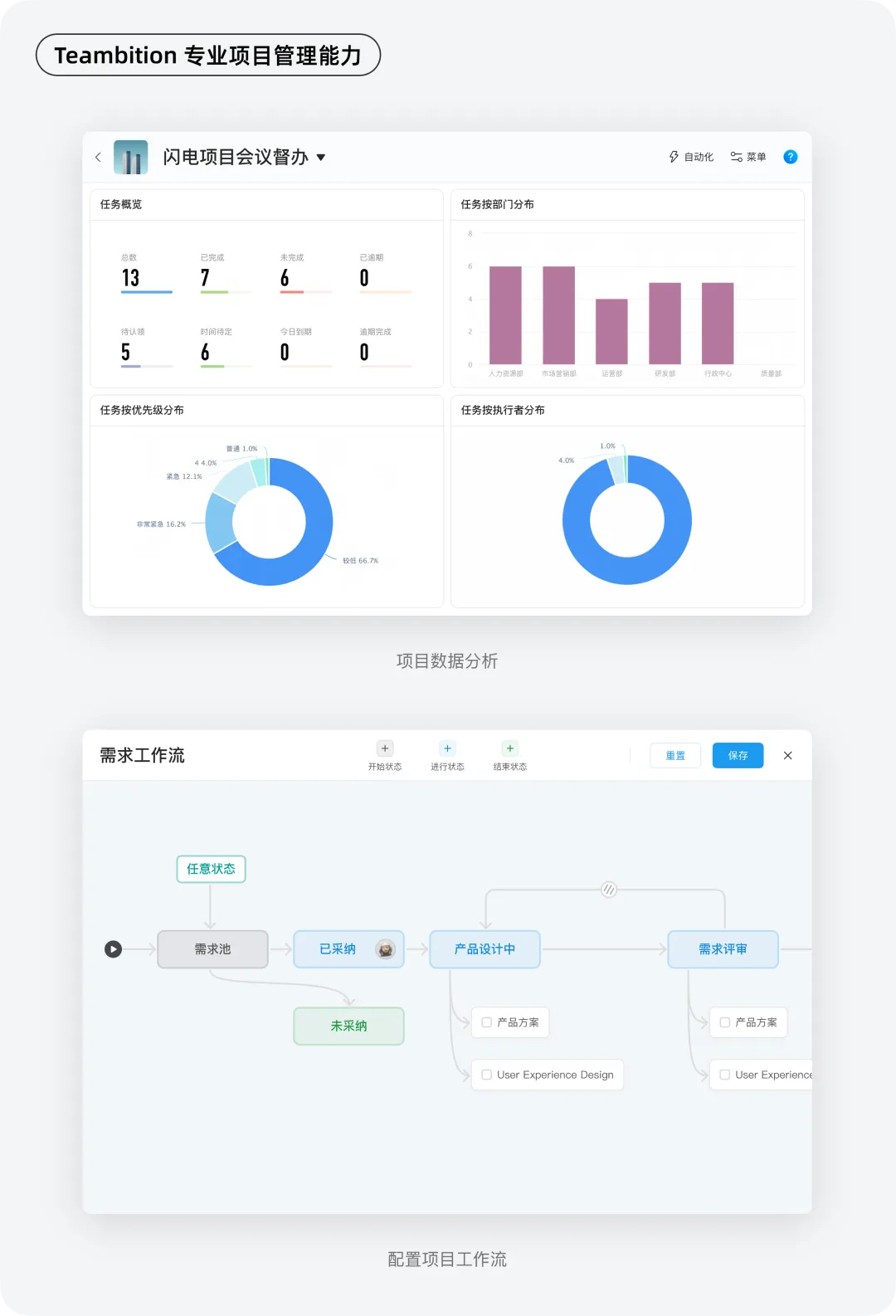
Conclusion
We believe high-quality meetings enhance information sharing, integrate perspectives, and realize data-driven decisions, thus propelling business growth. Improving meeting quality is a crucial challenge for every enterprise, with the essence of high-quality meetings lying in the efficiency of discussions and the effectiveness of decision-making (Decision).
DingTalk's high-quality meeting solution helps enterprise meetings achieve efficient discussions by ensuring meetings have themes before commencement, preparation before beginning; discipline, records, and conclusions during proceedings. Moreover, the follow-up and tangible results after meetings help enterprises achieve efficient decision-making.

 English
English
 اللغة العربية
اللغة العربية  Bahasa Indonesia
Bahasa Indonesia  日本語
日本語  Bahasa Melayu
Bahasa Melayu  ภาษาไทย
ภาษาไทย  Tiếng Việt
Tiếng Việt  简体中文
简体中文